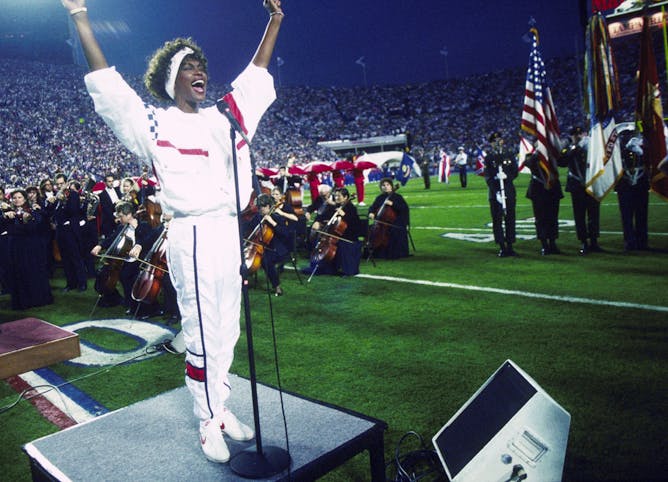|
Gone are the days when marching bands played the national anthem at the NFL’s quintessential Super Bowl. The first AFL-NFL championship game, in 1967, featured The Pride of Arizona, the Michigan Marching Band and the UCLA choir to present “The Star-Spangled Banner.”
Since then, only stars have sung it. Neil Diamond sang it in 1987, Luther Vandross in 1997, the Backstreet Boys in 2001 and Lady Gaga in 2016. By far, the most memorable rendition was delivered by Whitney Houston in 1991.
But as University of Michigan musicologist Mark Clague points out, the singing of the national anthem at football games is more than a venue for celebrity singers. It began as a patriotic marketing ploy during World War II. Over time, the anthem has triggered protests, none of which could stop the tradition. And for Mickey Guyton, the Black country singer who will belt out the song at this year’s Super Bowl, it’s a moment of a lifetime.
This week we also liked articles about the Japanese religion known as Shinto, earwax and Joe Rogan.
|

Whitney Houston sings the national anthem on January 27, 1991, at Super Bowl XXV during the Persian Gulf War.
Michael Zagaris/Getty Images
Mark Clague, University of Michigan
For the NFL, playing the national anthem started as a patriotic marketing ploy. It’s now played before every game alongside ‘Lift Every Voice,’ the Black national anthem, and ‘America the Beautiful.’
|

Step away from the cotton swabs!
Crazytang/iStock via Getty Images Plus
Henry Ou, University of Washington
That brownish/yellowish gunk that comes out on your finger if you scratch deep inside your ear? It actually serves an important purpose in your body.
|

Joe Rogan’s ability to attract young male listeners is particularly powerful in today’s fractured media environment.
Jeff Bottari/Zuffa LLC via Getty Image
Matt Sienkiewicz, Boston College; Nick Marx, Colorado State University
By sidestepping partisan pigeonholing and appealing to the anti-establishment impulses of young men, Rogan has brought together an audience that advertisers have long coveted.
|
|
|
-
Soomi Lee, University of South Florida
Age is no longer the only definition of midlife. An expert in aging explains why.
-
Kaitlyn Ugoretz, University of California Santa Barbara
An anthropologist of Japanese religion met followers of Shinto religion online and found how they were building a community and sharing instructions on practice.
-
Yeva Aleksanyan, Colorado State University; Jason Weinman, University of Colorado Anschutz Medical Campus
Some countries report higher rates of COVID-19 cases and deaths among men. This might be due to underreporting among women with limited health access.
|
|